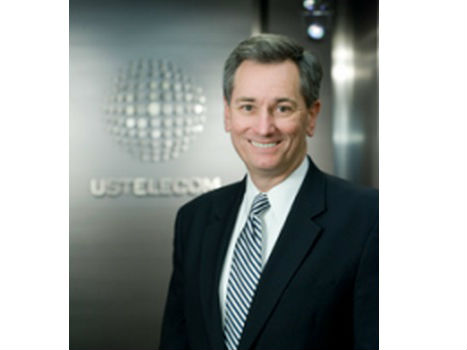USTelecom's McCormick: We Support the Open Internet Rules
The smarter way to stay on top of the multichannel video marketplace. Sign up below.
You are now subscribed
Your newsletter sign-up was successful

US Telecom President Walter McCormick says his association supports the substance of the FCC's new open Internet rules as outlined by the FCC and President Obama, which is no blocking or throttling or paid prioritization.
He suggested in an interview on C-SPAN's Communicators series that that was not a heavy lift because his industry operates under those standards already.
But USTelecom was among the first to sue to block the FCC rules this week after the final order was published in the Federal Register.
USTelecom's problem, as it is for the National Cable & Telecommunications Association (NCTA), is how those rules were enacted--by regulating information services as a common carrier, or what McCormick calls "19th century railroad regulation."
Christopher Lewis, VP of Title II fans Public Knowledge, was also on the program and stood up for the FCC's approach. He said that after a decade of trying to come up with rules that would hold up in court, Title II was the best way to do that. "Title II was necessary to get us to strong network neutrality rules," he said.
McCormick said that said the Internet is already open and that there is no blocking and throttling and it is so because that is how the people who operate Internet services conduct business. That is why he said USTelecom has no problem with the substance of the rules, either adopted into regulations or enacted into law, he said.
McCormick said the only reason the FCC is trying to use Title II to support Internet rules is because Congress did not give it authority to regulate the Internet. "The FCC was given authority to regulate telecommunications," he said. When Congress last weighed in in the 1996 Act, he pointed out, Congress said that there should be no federal or state regulation of information services, and it defined Internet access as an information service.
The smarter way to stay on top of the multichannel video marketplace. Sign up below.
"The FCC has no clear authority to regulate the Internet," he said. "We are advocating that this should be an area where Congress should act." In that USTelecom and the NCTA, which also filed suit, are in agreement.
Public Knowledge's Lewis countered that the FCC has always had authority over communications networks, and that those networks have evolved. He said the new rules help give the FCC the power to protect the openness of networks as they converge, but also said there is a "whole broader spectrum of values" that also need to protected and that Title II "gets us that conversation."
ISPs are concerned that that conversation then becomes about rate regulation, or preventing usage-based pricing, or regulating interconnection.
Lewis said the Internet had been successful and he wanted it to continue to be.
McCormick said the Internet has been as free as Uber, but now the FCC is acting like a taxicab commission for the Internet, potentially regulating rates and terms--through a case-by-case review process--which he said would slow innovation.
McCormick said the government had a role in protecting the Open Internet, but he said that role should be defined by the U.S. Congress, which has not provided guidance in 20 years. "It is time for Congress to provide the commission with clear authority to guarantee an open Internet, but to prevent the commission from having to redefine the entire Internet..."
McCormick insisted he was optimistic that Congress could act. "There is absolute consensus on the problem," he said, and that there is not clear authority, and that the solution is for Congress to supply that clear authority."
Lewis said there is room for optimism and a dose of reality. The dose of reality, he said, is the unintended consequences of the legislation on other broadband values. He said those questions are things like preserving universal service, privacy, and others.
Contributing editor John Eggerton has been an editor and/or writer on media regulation, legislation and policy for over four decades, including covering the FCC, FTC, Congress, the major media trade associations, and the federal courts. In addition to Multichannel News and Broadcasting + Cable, his work has appeared in Radio World, TV Technology, TV Fax, This Week in Consumer Electronics, Variety and the Encyclopedia Britannica.

